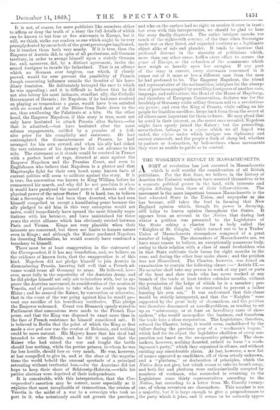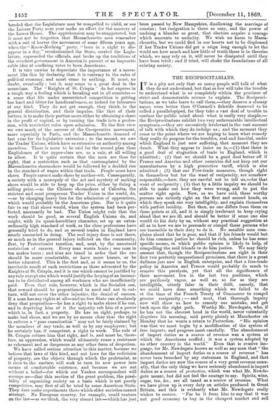THE WORKMEN'S REVOLT IN MASSACHUSETTS.
ASORT of revolution has just occurred in Massachusetts which is well worthy the consideration of all British politicians. For the first time, we believe, in the history of America the Unionist workmen have asserted themselves to be a separate political power in the land, with interests and objects differing from those of their fellow-citizens. The movement is the more important because Massachusetts is the best educated State in the Union, and unpopular as she has become, still takes the lead in forming that New England opinion which, though its power is decaying, still helps to leaven opinion throughout the States. It appears from an account in the Nation that during last winter a petition was presented to the Legislature of the State asking a charter for a body called the "Knights of St. Crispin," which turned out to be a Trades' Union of Massachusetts shoemakers composed of a great number of lodges. The shoemakers of Massachusetts are, we have some reason to believe, an exceptionally numerous body, owing to their relation with a class of small freeholders who in that State cultivate their farms for eight months in the year, and during the other four make shoes ; and the petition was not ill-received. The Charter, however, was found on examination to contain the following clause :—" Article IX.— No member shall take any person to work at any part or parts of the boot and shoe trade who has never worked at any branch of the trade at least twelve calendar months, without the permission of the lodge of which he is a member ; pro- vided, that this shall not be construed to prevent a father learning his own son." It was understood that this clause would be strictly interpreted, and that the " Knights " were supported by the great body of shoemakers, and the petition was therefore denounced as non-Republican, as tending to set up an "aristocracy, or at least an hereditary caste of shoe- makers," who would monopolize the business, and transform the trade into a close corporation. The Legislature, therefore, refused the Charter, being, it would seem, emboldened by the failure during the previous year of a "workman's league," which had for its object the legislative abolition of every cor- poration not based on the co-operative principle. The shoe- makers, however, nothing daunted, retired to form "a work- ing-man's party," which they organized in silence, and without exciting any considerable alarm. At last, however, a new list of names appeared as candidates, all of them utterly unknown, and a "platform," or declaration of principles, which the Nation does not give, but which seems to take its breath away, and both list and platform were enthusiastically accepted by numbers of workmen, who succeeded in returning to the Legislature some thirty representatives according to the Nation, but according to a letter from Mr. Conolly twenty- one, of whom seventeen are shoemakers. This number is not a majority, but it is large enough to give a preponderance to the party which it joins, and it seems to be seriously apple.
headed that the Legislature may be compelled to yield, or see the Labour Party next year make an effort for the mastery of the Lower House. The apprehension may be exaggerated, but it must not be forgotten that Massachusetts men remember with a sort of horror the movement of some fifteen years ago, when the " Know-Nothing" party, "born in a night to dis- appear in a day," revolutionized the State, carried the Legis- lature, superseded the officials, and broke up the traditions of the steadiest government in America in pursuit of an impracti- cable idea of confining votes to born Americans.
It is very unwise to depreciate the importance of a move- ment like this by declaring that it is contrary to the rules of political economy, and must come to nothing. It must, no doubt, eventually ; but it may come to a great deal in the meantime. The "Knights of St. Crispin" do but express in a rough way a feeling which is breaking out in all countries— a sense that life under unrestricted competition is getting too hard and bitter for handicraftsmen, or indeed for labourers of any kind. They do not get enough, they think, in the general distribution, and their impulse, like that of their betters, is to make their portion more either by obtaining a share in the profit of capital, or by turning the trade into a profes- sion, with restrictive rules upon admission. To the first view we owe much of the success of the Co-operative movement, more especially in Paris, and the Massachusetts demand of last year for its legislative extension ; to the second, we owe the Trades' Unions, which have so extensive an authority among ourselves. There is more to be said for the second plan than Englishmen of the upper-class are, as a rule, at all willing to allow. It is quite certain that the men are thus far right, that a restriction such as that contemplated, by the Massachusetts shoemakers would be followed by a decided rise in the standard of wages within that trade. People must have shoes. People cannot make shoes by mother-wit. Consequently, a society with a monopoly of the art and mystery of making shoes would be able to keep up the price, either by fixing a selling price,—as the Chinese shoemakers of Calcutta, the strictest and most prosperous Trades' Union in the world, do, —or by charging heavy fees for the admission of apprentices, which would probably be the American plan. Nor is it quite fair to say that shoes would, when the system had been per- fected, necessarily be bad. The Union might rule that the work should be good, as several English Unions do, and alight, with its quasi-hereditary character, set up an extra- ordinarily high standard of work, as the close professions have generally tried to do, and as several trades in England have mearly succeeded in doing. The real injury done is not there, so much as in the general injury inflicted on the community, first, by Protectionist taxation, and, next, by the unnatural restriction of careers. Every man wants boots ; one man in ten makes boots ; and nine are taxed in order that the one should be more comfortable, or have more leisure, or be better educated. This is the first and, as it seems to us, the inevitable result of such restrictions as those advocated by the Knights of St. Crispin, and it is one which cannot be justified by anyrule except one which would justify the levying of an income- tax to be distributed among all workmen who are insufficiently paid. Even that rule, however, which is the Socialist one, that reward should be proportioned to need and not to out- turn, will not cover the other injustice, the denial of careers. If a man has any rights at all—and no free State can absolutely deny that proposition—he has a right to make shoes if he can, and in depriving him of it the majority rob him of a power which is, in fact, a property. He has no right, perhaps, to make bad shoes, and we are by no means clear that the right to enforce a "pass examination" may not be fairly claimed by the members of any trade, as well as by any employers ; but he certainly has, if competent, a right to work. The rule of St. Crispin refuses him that right, and is, and must be, there- fore, an oppression, which would ultimately rouse a resistance as vehement and as dangerous as any other form of despotism.
We have called serious attention to this matter, because we believe that laws of this kind, and not laws for the redivision of property, are the objects through which the proletariat, as it rises to the surface, will seek to turn its new power into means of comfortable existence, and because we are not without a belief—for which our Yankee correspondent will scourge us—that this section of the great problem, the possi- bility of organizing society on a basis which is not purely competitive, may first of all be tried by some American State. They dare make experiments there which older societies cannot attempt. No European country, for example, could venture on the law—as we think, the very absurd law—which has just
been passed by New Hampshire, disallowing the marriage of cousins ; but emigration is there so easy, and the power of undoing a blunder so great, that electors acquire a courage which amounts to audacity. We wish no harm to Massa- chusetts, but we could find in our hearts not to be displeased if her Trades Unions did get a reign long enough to let the world see how much and how little of truth there is in theories which, we may rely on it, will never be dissipated until they have been tried ; and if tried, will shake the foundations of all existing society.







































 Previous page
Previous page